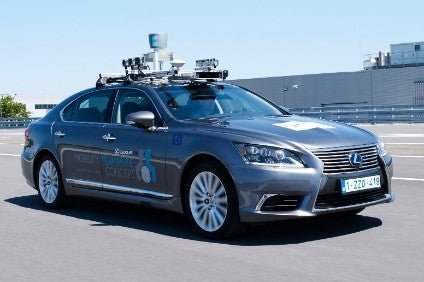
Toyota Motor Europe (TME) said on Friday (12 July) it would begin testing automated driving (AD) technology on public roads with the launch of programme that will trial its in-house developed systems around the streets of Brussels, where the European distribution operation is based.
For the next 13 months, a Lexus LS will make repeated journeys around a fixed route in the Belgian capital.

Discover B2B Marketing That Performs
Combine business intelligence and editorial excellence to reach engaged professionals across 36 leading media platforms.
The new test programme follows successful simulations and trials on closed circuits and previous public road tests in Japan and the US.
The test car is a standard production model and will be driven on regular, open roads. A key difference is a roof-mounted array of sensors including LIDAR (laser imaging detection and ranging), radars, cameras and a high-precision positioning system.
A safety driver will travel in the car to intervene and overrule the AD vehicle control system as necessary. Drivers will be accompanied by operators who will supervise the entire system.
Toyota said it had taken months of thorough preparations to bring the car to the open road, validating the AD system, training the drivers, analysing the route and engaging with local authorities to gain necessary approvals.
The automaker said its research ties in with its global vision to create safe 'Ever Better Mobility for All'. It sees the relationship between driver and car as teammates working together, an approach to mobility it has dubbed the Mobility Teammate Concept. With the aim of realising safer and more accessible mobility, it is working on two different automated driving models in parallel: Guardian and Chauffeur.
At the same time as it is developing these technologies, Toyota is also making advanced safety and driving assistance systems popular and affordable with the introduction of Toyota Safety Sense and Lexus Safety System+2 to its model ranges.
European L3Pilot
The automated vehicle will also be used to collect data as part of Toyota's involvement in the European L3Pilot project alongside 34 other partners, including a number of major car manufacturers, automotive suppliers, research institutes and authorities. The L3Pilot is a four-year European project, launched in 2017 and partly funded by the European Commission. The project paves the way for large-scale AD field testing of around 100 cars and 1,000 drivers across 10 European countries. Within this framework, TME will concentrate on researching customer behaviours and the safe operation of systems in complex and diverse urban environments.
Gerard Killmann, TME's head of research and development, said: "Within Toyota's global operations, TME's Brussels R&D facility is the regional centre of excellence for computer vision – making computers 'see and understand' the environment around them. Our ultimate goal is zero casualties from traffic accidents, and the main goal of this pilot is to study complex and unpredictable human behaviour and its impact on automated driving system requirements.
"Responding to the complexity and diverse population of an urban environment like Brussels – the European capital and home to citizens of 184 different nationalities – is key to understanding human behaviour. After successful trials on public roads in Japan and the US, we are now adding European conditions to the technology's understanding."






